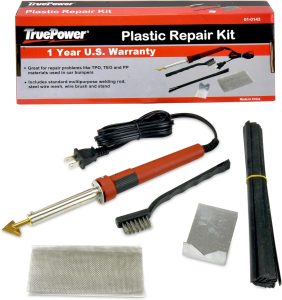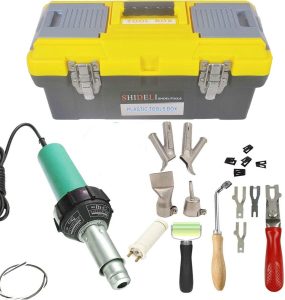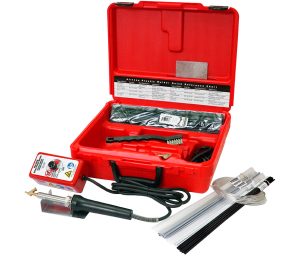Plastic welding or epoxy repair?
A plastic welded repair is often considered better than a two-part epoxy repair for several reasons:
- Strength: Plastic welding creates a bond that is as strong as the original material, whereas epoxy may not provide the same level of strength.
- Durability: Welded repairs can withstand more stress and are less likely to crack or break compared to epoxy repairs.
- Appearance: Plastic welding can result in a seamless repair, maintaining the original appearance of the item, while epoxy might leave visible seams or discoloration.
- Versatility: Plastic welders can be used on a wider range of plastics compared to some epoxies that may not adhere well to certain types.
- Sustainability: Welding repairs the plastic by fusing it, so it becomes part of the material. What are the different types of plastic welders?
What are the different types of plastic welders?
For the automotive industry, there are 3 main types:
- Airless Plastic Welders: These welders use a heated metal tip to melt the plastic and a welding rod to fill in the damaged area. They are commonly used for repairing cracks, holes, and tears in various types of plastic.
- Hot Air Plastic Welders: These tools use a stream of hot air to melt the plastic and a welding rod to add material to the repair. They are versatile and can be used on a wide range of plastics, including those used in bumpers and headlights.
- Plastic Welders with Staple Systems: These welders combine traditional plastic welding techniques with the use of stainless steel staples to reinforce the repair. The staples provide additional strength and stability to the repaired area, making them ideal for larger cracks and splits in bumpers and other plastic parts.
Polyvance Mini-Weld Model 7 Airless Plastic Welder: 
A popular choice for professionals, this welder is known for its reliability and versatility in welding various types of plastic.
- Pros:
- Versatile: Can weld a wide range of plastics.
- Easy to use: Simple operation, suitable for beginners and professionals.
- Durable: Sturdy construction ensures longevity.
- Portable: Compact design makes it easy to transport.
- Cons:
- Limited temperature control: May not be suitable for “all” types of plastics.
- Learning curve: Some users may need time to master the technique.
- Higher cost
TruePower Plastic Welding Kit With Plastic Rods:
Best bang for the buck, offering everything needed to start plastic welding at an affordable price. It’s lightweight and easy to operate but can be slow on some materials.
- Pros:
- Affordable: Good value for the price.
- Airless and simple to use
- Lightweight: Easy to handle for extended periods.
- Cons:
- Inconsistent temperature: Can affect the quality of the weld.
- No temperature control
All turn Hot Stapler Plastic Welding Repair Kit:
Best for automotive repairs, capable of melting rods into splits or cracks and embedding metal staples for extra joint strength. It’s well-balanced and heats up quickly.

- Pros:
- Reinforcement: Staples provide additional strength to repairs.
- Versatile: Suitable for various types of plastic repairs.
- Easy to use: Simple operation for quick repairs.
- Kit has plenty of accessories, airless with staples.
- Cons:
- Limited to thinner plastics: May not be effective for thicker materials.
Go2Home 1600W Plastic Welder
This is a hot air welder that works with all plastic and can do thicker material.

Pros:
- Powerful: 1600W output suitable for thicker plastics.
- Adjustable temperature: Can be tailored to different types of plastics.
- Comes with extra tools for even the tougher jobs.
Cons:
- Bulky: Larger size may be less portable.
- Learning curve: May take time to master temperature settings.
WELDY Energy HT1600 Hot Air Torch
The WELDY energy HT1600 is a durable and compact hot air tool designed for various professional uses. It stands out for its modern design, solid performance, and excellent value for money.
Pros:
- Specifically designed for welding PVC and TPO membranes, making it ideal for tasks like sealing roofs and joining industrial fabrics and tarpaulins.
- 20 mm and 40 mm wide slot nozzles, and a 40 mm silicone pressure roller.
- Adjustable hot air temperatures from 100°F to 1290°F (40°C to 700°C).
Cons:
- Not made specifically for the automotive field.
- Higher cost.
- Does not come with any plastic fillers
Astro Pneumatic Tool 7600 Hot Staple Gun Kit

- Pros:
- Reinforcement: Staples provides strong support for repairs.
- Versatility: Can be used on various plastic types.
- Easy to use: Quick and straightforward operation.
- Cons:
- Staple visibility: Repaired area may show staple marks.
- Limited application: Primarily for reinforcing, no welding or smoothing tip welding.

